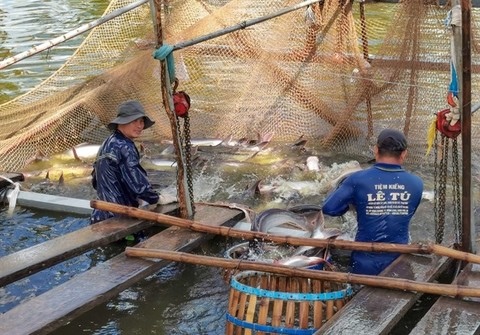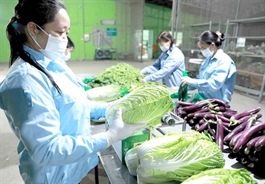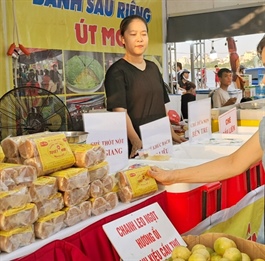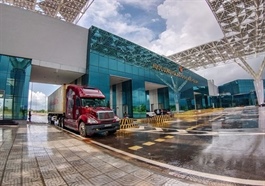Seafood firms struggle despite market improvement
Seafood firms struggle despite market improvement
Despite positive market indicators, the business picture for the seafood industry remains less than favourable, characterised by sluggish growth and even declining profits.

Categorising pangasius for processing and export optimisation at a plant. — VNA/VNS Photo |
In the first half of the year, seafood exports totalled US$4.355 billion, up 4.9 per cent year-on-year, with most key products showing notable growth, according to a report from the Fisheries Department, Ministry of Agriculture and Rural Development.
During the period, the value of shrimp exports was over $1.6 billion, a 7 per cent rise from the previous year. Meanwhile, export of pangasius, the primary seafood commodity for export, reached $922 million, reflecting a nearly 6 per cent uptick compared to the corresponding period.
Despite improvement in market demand, export prices to key markets like China, the European Union (EU) and the UK remain low. Only the US market displays more promising signs, in terms of both pricing and import volumes.
In this scenario, seafood industry enterprises have observed significant revenue improvements. However, amid escalating raw material costs, depressed selling prices and numerous additional expenses, profit margins for these companies have shrunk.
Declining growth amid cost pressures
Vĩnh Hoàn Corporation (VHC), the largest listed pangasius enterprise on the stock market, experienced revenue growth but faced declining profits due to the sharp drop in pangasius product prices.
In the second quarter, Vĩnh Hoàn saw a 17 per cent rise in net revenue to nearly VNĐ3.2 trillion ($127.5 million). However, due to shrinking profit margins, its gross profit fell by 20 per cent to VNĐ462 billion.
Expenses surged, with financial costs at VNĐ57 billion and sales and administrative costs at VNĐ141 billion, up 15 per cent and 23 per cent over last year, respectively.
After deducting expenses, the company reported a profit of VNĐ336 billion, down by 26 per cent over last year. The company attributed the ongoing profit decline to reduced selling prices of the pangasius product.
For the first six months of 2024, it recorded revenue of over VNĐ6 trillion, a 22 per cent increase year-on-year, with profits amounting to VNĐ525 billion dong, down 23 per cent.
In the same pangasius enterprise category, I.D.I International Development & Investment Corporation (IDI) also faced a similar situation.
Its net revenue for the second quarter of 2024 stood at over VNĐ1.9 trillion, up 6 per cent year-on-year growth.
Due to a substantial surge in the cost of goods sold, which surpassed the revenue increase, the company experienced a slight dip in its gross profit, settling at VNĐ154 billion.
In the period, escalating transportation expenses and steep ship fares drove the company's selling costs up to VNĐ46 billion, marking a notable 42 per cent rise.
IDI also witnessed a 45 per cent decline in its other income, which dropped to nearly VNĐ3 billion.
After accounting for expenses, the company reported a profit of VNĐ18 billion, down 31 per cent from last year.
For the first half of the year, IDI's net revenue reached over VNĐ3.56 trillion, showing a marginal decrease from the corresponding period in 2023. Its profit was VNĐ35 billion, a 20 per cent decrease from the previous year, achieving 12 per cent of its profit target.

Farmers harvesting pangasius in Cần Thơ City. — VNA/VNS Photo |
While the seafood industry shows promise, companies like Minh Phú Seafood Corporation (MPC) and Nam Việt Corporation (NAVICO) have not made substantial progress despite operational enhancements.
At Minh Phú, the company fell short of a five per cent profit target, despite returning to profitability after facing losses.
The company, known as the shrimp king in the domestic market, reported a robust 59 per cent increase in net revenue, reaching VNĐ3.7 trillion in the second quarter. Its financial revenue also surged significantly to VNĐ32 billion dong, marking a 2.6-fold increase.
In contrast, financial costs rose by 39 per cent to VNĐ70 billion.
Following the deduction of expenses, Minh Phú achieved a profit after tax of VNĐ38.4 billion, a 3.8-fold increase compared to the same period last year.
The results were attributed by Minh Phú to the effective operational performance of its shrimp seed and commercial shrimp farming divisions at the onset of the period.
For the first half of 2024, the company recorded net revenue of nearly VNĐ6.5 trillion, up 45 per cent from last year.
After taxes, the company reported a profit of VNĐ45 billion, a remarkable improvement from the VNĐ88 billion loss reported during the same period last year. However, the result only represents 3.6 per cent of the annual profit target.
Despite turning a profit in the second quarter of 2024, NAVICO faced a challenge as the modest profit couldn't offset the previous quarter's losses, causing a setback in the company's performance for the first half of the year.
In the second quarter, the company achieved net revenue of over VNĐ1.19 trillion, up 11 per cent over last year.
While the cost of goods sold spiked, its growth rate was slower than that of revenue, resulting in the company’s gross profit soaring by 2.9 times to VNĐ143 billion.
Consequently, NAVICO reported a profit of VNĐ17.5 billion, showing a significant improvement from the VNĐ51 billion loss reported in the corresponding period last year.
In the cumulative first half of 2024, it generated a net revenue of VNĐ2.2 trillion, a slight decline compared to the same period in 2023.
The company posted a profit of VNĐ34 billion, down 17 per cent from last year.

























